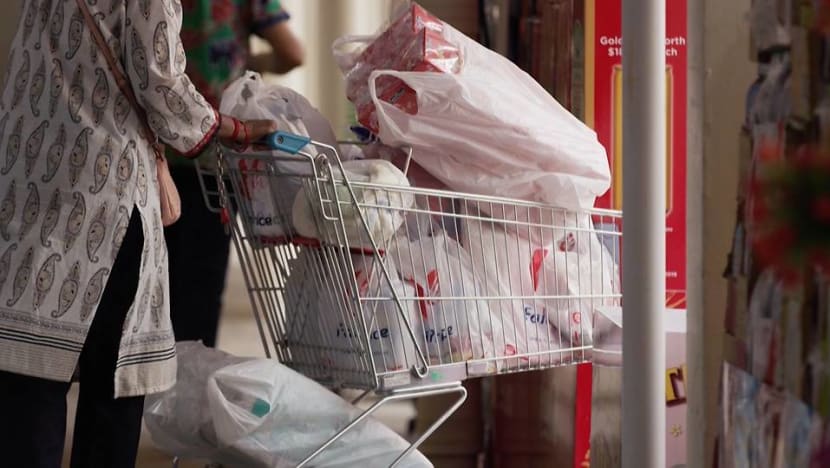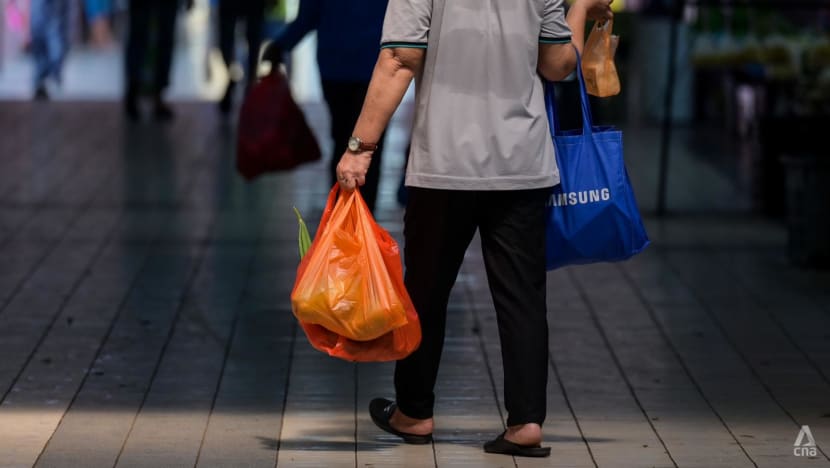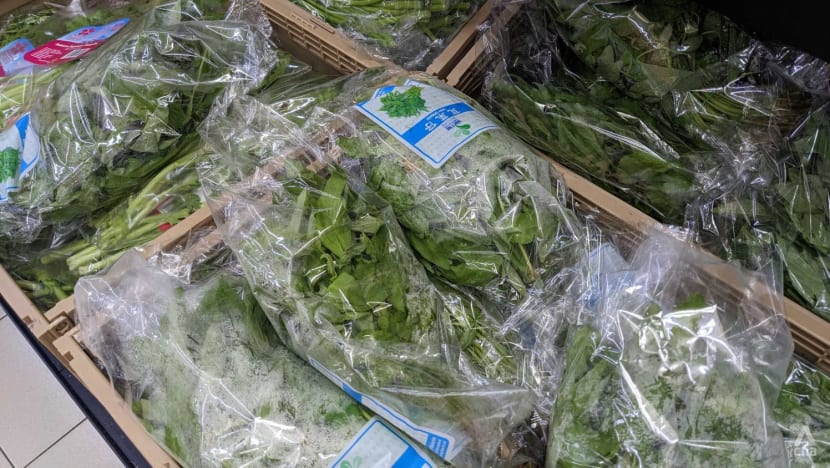Commentary: Four months on, what has Singapore’s disposable carrier bag charge really done to ease the waste problem?
It’s been four months since major supermarkets started charging at least 5 cents for each disposable carrier bag. While commendable, it’s not sufficient to make an impact on Singapore’s growing waste problem, says Singapore Environment Council chairman Isabella Huang-Loh.

Consumers in Singapore take about 820 million plastic bags from supermarkets each year, or about 146 bags per person per year.

This audio is generated by an AI tool.
SINGAPORE: If you want to change someone's behaviour, the best way is to hit them in the pocket. Or so the saying goes.
Come Nov 3, it will be exactly four months since major supermarkets in Singapore started charging customers at least S$0.05 (US$0.03) for each disposable carrier bag they take.
The move has seen some success, with supermarket operators giving out significantly fewer disposable carrier bags - some have reported reductions of 50 per cent to 80 per cent compared to last year.
Under the new rules that kicked in on Jul 3, supermarket operators with an annual turnover of more than S$100 million are required to charge customers at least S$0.05 for each disposable carrier bag. These operators - which include NTUC FairPrice, Cold Storage, Giant, Sheng Siong and Prime Supermarket - account for around two-thirds, or about 400, of all supermarkets in Singapore. They’ve said that the proceeds will be used for social and environmental causes.
Considering that consumers in Singapore take about 820 million plastic bags from supermarkets each year, or about 146 bags per person per year according to a 2018 study by the Singapore Environment Council, the disposable carrier bag charge provides hope that by experiencing tangible consequences, people will be compelled to reconsider their choices and adopt more eco-friendly practices.
In Singapore, many disposable carrier bags come in the shape of plastic bags. How significant will the new rules be in reducing plastic bag use in Singapore in the long run, and will residents become immune to paying the additional charge?
BEHAVIOURAL CHANGE OR COMPLIANCE TO REGULATIONS
Singapore has launched various initiatives over the years, including Bring Your Own Bag Day in 2007, the One Less Plastic campaign in 2018 and the current Say YES to Waste Less movement.
All those campaigns aim to raise public awareness about the environmental consequences of disposables and encourage consumers to adopt more sustainable alternatives.
It can be argued that without those campaigns, Singapore’s plastic bag use would be way higher than the current 820 million. In fact, in 2011, consumers in Singapore used about 3 billion plastic bags.
Over the decades, many jurisdictions have adopted various policies to reduce the consumption of plastic bags either through bans, fees on customers or taxes on stores that sell them.
The first country to levy plastic bags was Denmark, which in 1994 started taxing manufacturers based on the bag’s weight. Stores could pass the cost down to consumers.
In this part of the region, Bangladesh in 2002 imposed a total ban on thin plastic bags. Other nations followed suit. In 2002, Taiwan too introduced a policy to ban large-scale retailers such as supermarkets, fast food chains, government agencies and public hospitals from giving out free plastic bags.
Within the first year, Taiwan’s plastic bag usage plunged almost 80 per cent. In 2018, Taiwan added seven more types of businesses to the plastic bag ban, including bakeries, pharmacies and bookstores.
In Malaysia, where consumers use an estimated 9 billion plastic bags every year, all state governments in 2022 agreed to a “pollution charge” of at least RM0.20 per plastic bag. Penang, which was the first state to do so in 2009, raised the plastic bag fee to RM1 in 2021. It also restricts the purchase of plastic bags to only Thursdays to Sundays, with no plastic bags sold on the other days. This has led to a 78 per cent decrease in plastic bag consumption between 2020 and 2021.
Despite these efforts, the world is producing a record amount of single-use plastic waste. It is estimated that the world generated 139 million tonnes of single-use plastic waste in 2021, according to the Plastic Waste Makers Index, an increase of 6 million tonnes from 2019.
While charging for plastic bags is an effective short-term strategy to reduce consumption, questions arise over its long-term effectiveness as people become accustomed to it. What initially may seem like an inconvenience or a financial burden may become the new normal, reducing the behavioural impact of the fee.
Charging for plastic bags may also inadvertently lead to an increase in the use of alternative single-use bags. Shoppers might opt for these alternatives and buy bundles of single-use bags for garbage disposal, believing they are better value for their money.

The journey towards a zero-waste nation requires a concerted effort from all stakeholders, from governments to corporations. We must also consider other strategies in tandem with the disposable carrier bag charge to truly make a difference in reducing plastic waste.
Singapore’s plastic waste landscape is far from ideal - in 2022, only 6 per cent of all plastic waste generated was recycled. This means that most plastics are incinerated. While incineration reduces waste volume and helps land-scarce Singapore extend the lifespan of Semakau Landfill, it also generates carbon dioxide emissions.
Singapore is actively working towards a more circular economy with efficient recycling systems, but the current plastic recycling rate poses a hurdle in achieving a full circular economy. On top of that, Singapore also faces challenges when it comes to converting plastic waste back to raw materials, given that recycling infrastructure requires sufficient economies of scale to set up.
For consumers, the most direct path towards reducing our plastic waste is to minimise the use of plastic bags and other disposables whenever possible.
Our research found that on average, a Singaporean consumer uses two to four plastic bags on every trip to the supermarket. Consumers can start by being more mindful of their plastic consumption and make a concerted effort to reduce it by half, aiming to limit their use of plastic bag to just one per visit, if needed. By adopting such responsible practices, we can collectively contribute to curbing plastic waste and foster a more sustainable future for Singapore.

It's essential that each of us recognises the impact of our actions on the environment. While it is encouraging that Singapore is taking actionable steps to encourage consumers to reduce the use of plastics, S$0.05 per bag may not be sufficient to make an impact on our country’s growing waste problem.
The responsibility does not solely rest on consumers; businesses also need to play a crucial role in this journey.
That is not to suggest that plastics should be entirely eradicated from Singapore, as they have their essential uses, particularly in fields like healthcare. Instead, businesses should re-evaluate their product delivery processes and restructure primary, secondary and transhipment packaging to reduce plastic use. The redesign not only benefits the environment, but can also lead to cost savings.
Where packaging is necessary, businesses can consider how the packaging can be designed for reuse multiple times. These reuse models ensure that plastics remain within the economy. When such packaging finally becomes damaged or worn out after multiple uses, businesses can make it easy for consumers to recycle such packaging by labelling it with clear information and designing it to be easily recyclable.
JUST THE BEGINNING
While the introduction of a nominal charge for disposable carrier bags at larger supermarkets has garnered support from consumers, it is important to remember that this is just the beginning.
Addressing Singapore's plastic waste issue requires a comprehensive approach, with both consumers and businesses actively embracing sustainable alternatives and re-evaluating their approach to the habits of plastic and other disposables usage.
We can all start by bringing our own bags for the grocery run.
Isabella Huang-Loh is chairman of the Singapore Environment Council.



















